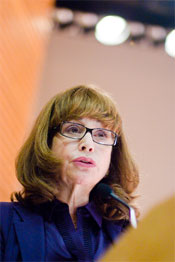The State of the College: Emerging Stronger from Trying Times
With that blunt assessment, TC President Fuhrman began the annual State of the College meeting on October 17th -- an event that this year was held against the backdrop of turmoil that had gripped the College a week earlier when a noose was found hanging on the door of an African American faculty member, Madonna Constantine.
Transcript and Video online.
"This past week has tested our community like no other in recent times."
With that blunt assessment, TC President Fuhrman began the annual State of the College meeting on October 17th -- an event that this year was held against the backdrop of turmoil that had gripped the College a week earlier when a noose was found hanging on the door of an African American faculty member, Madonna Constantine.
The incident was a reminder that "ignorance and hatred are to be found even in the most enlightened of institutions, Fuhrman said, and "it targeted all of us who believe in diversity -- not only of race and class, but of experience, thought, inquiry and education. And thus it targeted education itself -- education in its truest sense as we have always defined it here at Teachers College -- because those are the four pillars on which true education is built."
Fuhrman said that the communitywide self-scrutiny and discussion that have followed the incident, as well as the outpouring of support for Constantine and another faculty member, Suniya Luthar, who was unfairly targeted in the media, are clear signs that "those pillars, those core values of education, are enduring and strong at Teachers College.
"I say that knowing that there is much in our house that needs strengthening, reaffirming, renovating and simply building anew," she said, citing a need to increase recruitment of faculty of color, to reconsider whether TC's curriculum sufficiently emphasizes multicultural issues, and to improve the general climate at the College around race.
"Is Teachers College a place free from what Professor Constantine and her colleague, Derald Wing Sue call -'micro-aggressions' -- the range of unintended slights, indignities, misunderstandings and other insults that well-intentioned members of a dominant group regularly visit upon members of minority groups? No, it is not," Fuhrman said. However, changes are already in the works, she said, adding that the College has been in conversation with Clement Price of Rutgers, one of the country's leading experts on how to talk candidly about racial issues. The College's Committee on Community and Diversity is also creating a plan to expand sense of community at TC by addressing a range of functional and cultural issues here. Fuhrman said the effort's focus will range from historical reeducation on racist symbols, to how faculty, students and staff inter-relate, to "the simple act of how we all break bread with one another and celebrate ourselves on a daily basis."
Fuhrman then turned her attention to a range of other community-building initiatives at TC. While these are externally focused efforts to partner with policymakers and practitioners to improve lives, they require greater collaboration within the College to be successful, Fuhrman said.
"Collaboration of this kind entails true awareness of and respect for one another's work -- to expand our horizons and look at research questions through the lenses of other cultures, paradigms and viewpoints," she said, adding, "My single greatest priority for this institution is to increase these partnership efforts and bring greater unity to them so that they can be as consequential as possible."
One such initiative is explicitly internally --focused: a series of "self studies" and external reviews in which visiting scholars will help TC's nine academic departments look for better internal alignments and connections. Yet the results could potentially have enormously positive consequences for the institution's ability to make a positive impact on the world. Fuhrman cited the series of "white papers" being written by a cross section of TC faculty under the auspices of the Campaign for Educational Equity, summarizing current knowledge and questions that still need asking in 12 equity related areas.
"Taken together these papers will ultimately constitute a road map for the future of educational research in the U.S., one that builds on the documented success of recent decades," Fuhrman said.
Looking beyond TC's walls, Fuhrman said she is "hugely excited" about the College's newly ramped up collaboration with New York City public schools. Headed by Associate Vice President Nancy Streim, the effort has identified a small group of schools from TC's local district that the College will partner with closely "to the point where we will be helping them on a range of curricular, instructional, professional and community related issues," Fuhrman said. "We are intentionally placing ourselves on the hook for how these schools and their students perform -- and in doing so we intend to put the best resources of our faculty and students at their disposal. We can't do it unless we reach out to one another here at TC to find the best minds for each of the vast number of problems and challenges we will be tackling."
Before opening the floor to questions and discussion, Fuhrman said, "If we can make -'partnership' our watchword in our dealings both with the outside world and each other, then I think we will be doing our utmost to live the ideals of this institution. We are fortunate because, as this past week showed us, we have the pillars on which to build. But as it also showed us: the urgency to build upon them has never been greater than now."
Published Friday, Oct. 19, 2007
